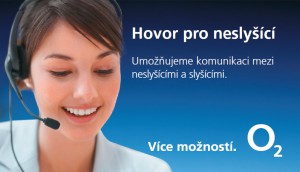Information and Communication Technologies (ICT) offer new opportunities for all players in society, but even more so for people with disabilities, since the use of such technology allows them to carry out daily tasks and activities independently. By having suitable and accessible equipment, people with special needs find a truly revolutionary tool in ICTs. It is the key that allows them to improve their quality of life, have access to education, work, leisure, or social and political life. Through the supply of products and services that are tailored to the needs of people with disabilities, Telefónica aims to promote their inclusion as citizens, employees, customers or suppliers worldwide.
An example of this is the so-called e-writing phone, i.e. a newly created Internet or mobile application that replaces the traditional writing phone with a keyboard that allows customers to communicate with the Telefónica Hearing-impaired Line in the Czech Republic (a non-stop line to help hearing-impaired people run by Telefónica Czech Republic since 1997).
The Hearing-impaired Line is a unique service which helps hearing-impaired customers on their communication with authorities, appointments with doctors, apologise their children in schools and deal with various routine daily matters, such as calls to various mobile operators and payment of invoices for gas or electricity. It also works the other way around – it may be used for leaving a message to the hearing-impaired person that the operators “translate” into an e-mail, SMS, fax or phone message. Most of the enquiries are handled via e-mail. In the first eight months of 2012 alone, the Hearing-impaired Line’s operators handled more than 17,000 requests, meaning 3,000 more requests than it was for the full year 2011. The advantage for users is that since 2010 the service is completely free.
The e-writing phone is in line with the European Disability Strategy, which aims to empower people with disabilities so that they can enjoy their rights and participate fully in society (according to available statistics in the Czech Republic up to 300,000 people are hearing-impaired in that country). The European strategy identifies actions at EU level to supplement national measures. It also identifies the support needed for funding, research, awareness-raising, statistics and data collection
The inclusion of people with disabilities in general and hearing impaired people in particular depends on the creation of accessible societies. Frameworks for action like the European Disability Strategy, initiatives of awareness such as the International Week of the Deaf (last full week of September) and products and services like the e-writing phone and the Telefónica hearing-impaired Line help to promote the inclusion of hearing impaired people and contribute to create accessible societies.
Fátima Araluce M.A.| Telefónica Czech Republic, a.s.
Reputation and Corporate Responsibility Manager










